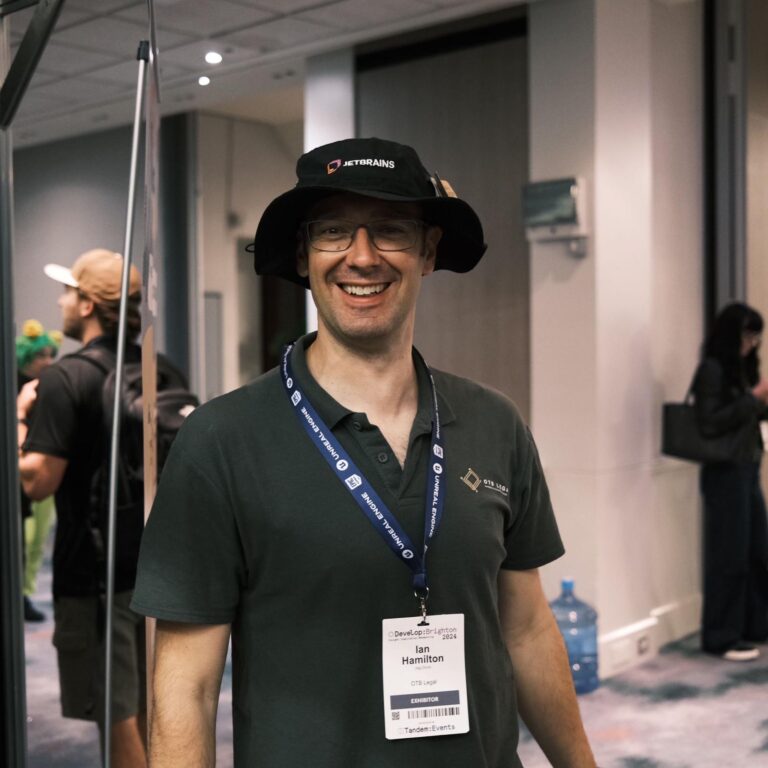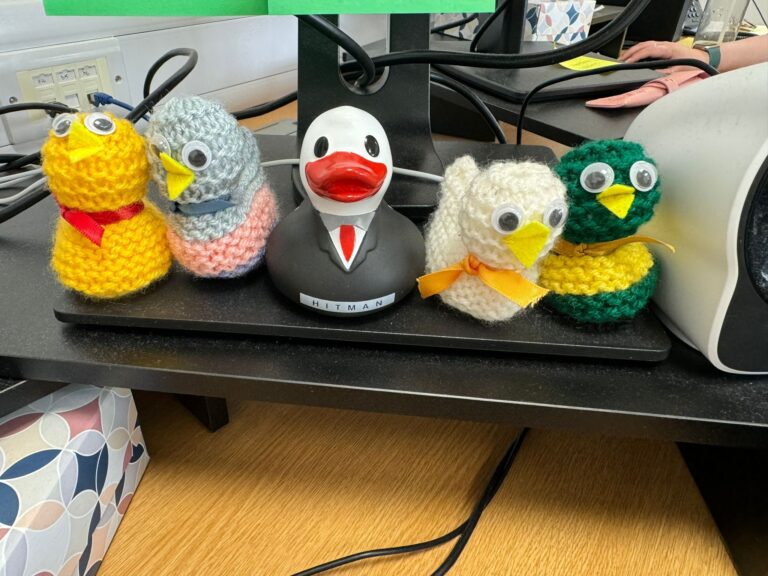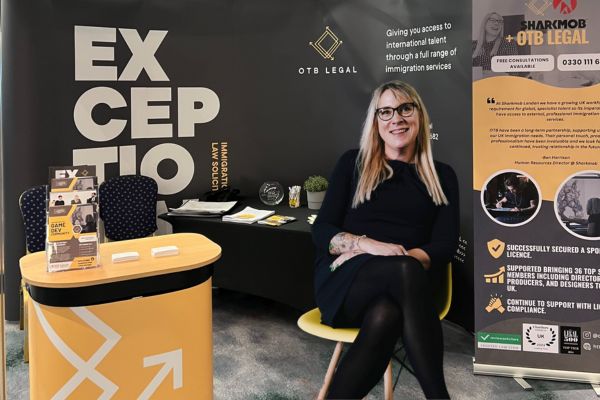Conversations with Developers 2024: Tech Talent Dialogues
Hi Developers!
Another year another great experience at Develop! Attending conferences is more than just about work, it’s about engaging with the community and working together as a team. We’ve got lots of new stories to tell our colleagues; IO Interactive helping me add to the growing flock of ducks on my desk (see our twitter on Monday when I’m back in the office for a picture), Ian being excited about his new hat (let’s see if he lets us put a picture of that up too!), Tom forgetting to order anyone else food, Hannah insisting she’d be brilliant in the SAS (unless they ask her to run up a hill), Sally continuing her annual tradition of locating the popcorn stand with the kind of efficiency only an experienced immigration lawyer possesses and even company friend, and freelance developer available for hire, Will agreeing to work on a special project with us for the future (watch this space…..).
We also owe Sharkmob London a special thanks for providing us some testimonials and sharing their branding with us. To those who got a little mixed up, we’re definitely not Sharkmob but we do love working with them! As shoutout as well to the people team at Anything World for helping me come up with a sub header for this blog.
Just like last year we aren’t just here to talk, we’re here to listen too. Every year we come to Develop we feel more and more like part of the community rather than just guests and a big part of that is the generosity that you, the developer community, show us in sharing your insights and experience with us. Once again I’ve put together a short article that sums up the top five themes people talked to us about, and how that relates to immigration factors that you should be aware of.
The Tech Industry is turning a corner
This may sound mundane, but it’s one of the most interesting and useful insights we heard this week. In my capacity working with Global Talent applicants I get a lot of questions about how recruitment is going. These applicants are quite often leaving their current business or entering the UK for the first time and looking for work in an industry that has been heavily in the press for large scale layoffs over the last few years can be a little daunting, regardless of how much experience you have.
The good news is that we’ve consistently been told that things are starting to get better. That doesn’t mean that recruitment is booming in the same way it was before, but things are starting to move in the right direction again. This is great for people across the immigration system, it offers those on skilled worker visas better stability and security and makes life easier for global talent applicants moving around.


AI explosion
One of the most notable sights walking around the conference floor was the increase in the integration of AI within the gaming sector. In some cases AI can have a bit of a bad reputation within the industry. There are increasing concerns around the ethics of how training data is used for generative AI, in particular when looking at concept art or in-game assets as well as the impact this has on career pathways for people trying to enter the industry. The same concerns can extend to coding. One attendee told me a story about a developer who generated code using Chat GPT but didn’t understand how it worked so when something broke, much more time was spent trying to fix it than if it had been written by hand.
These are reasonable concerns but the AI should also be treated like any other technological advancement, it is a powerful tool that can be used to great benefit in a narrow scope. Let’s use an analogy: back when I worked in sound engineering I was asked by someone what the best DAW (digital audio workstation) to use was. The answer is always, “depends on the job”. If I was recording I liked using Pro Tools, if I was writing I liked using Logic (or Cubase for those windows users), sampling or electronic music was done on Ableton and so on. The most successful uses of AI we are seeing use the same approach, identifying a specific, narrow, use case to use AI and then pairing that with a skilled developer who can add the human touch is a significant development in the industry.
How does this link with Immigration? Well, people who hold this level of expertise in AI are like gold dust. I’ve worked with a few successful applicants on the Tech Nation global talent route with this approach and they’ve been snapped up by the endorsing body. Similarly, for those who would prefer the simplicity of a skilled worker visa these are clearly justifiable roles to recruit to from a skill level position, provided you can pay the appropriate salary level.
It’s hard for international graduates
It’s never easy trying to break into this industry for graduates, but it’s even harder now for international students as they leave university. The changes to the immigration rules in April 2024 drastically increased the salary requirements to recruit onto the skilled worker visa. For a developer you are now looking at a minimum salary requirement of £40,000 – £60,000, even relying on the new entrant requirements for graduates and young people this is still around £31,000 plus. While some will still be able to make it on this route, for many studios we talk to this is simply too high for an entry level salary and even for those who can afford it they can only rely on this ‘discount’ for four years, maybe two if the worker was previously on the graduate visa. They would then need to significantly increase the salary for the remaining time towards settlement.
Similarly, we spoke to one burgeoning start-up who were coming out of university and had a team of around seven who wanted to start an indie studio together. A couple of these developers would need visas to continue on in the UK. With a group of this size and this number of settled or British founders, securing a sponsor licence would be viable but then you have the issue of a newly founded company looking to cover this level of salary requirement. It seems unlikely that this would be viable without significant outside investment.
For many in this situation the best approach now is to move to the graduate visa (which allows for two years of work without needing to have a sponsor or minimum salary) but this presents a high degree of risk, particularly for those establishing a business that they may need to leave or wind up if they can’t resolve the visa issues. Given the timeframe for modern development cycles, most wouldn’t be able to launch a game in this time meaning it remains a question of how many will be willing to take the financial risk. These changes do risk pushing a great deal of talent outside the UK.
It’s so expensive
Cost is a big factor on everyone’s minds. We’ve touched on this a little above when looking at salaries, but the general fee increases across the board in 2023 and 2024 have also had a big impact.
One company we spoke to told us that, after accounting for licence related costs, visa fees for the applicant, visa fees for the applicant’s family, and recruitment fees (for their recruiter) they had paid an additional £30,000 on top of their applicant’s salary. Put that into context with the issue graduates are facing in the section above and you can see that, even if a company were willing to pay the new entrant salary rates, during the first year of employment they would be paying for the equivalent of a mid-level or senior developer.
This can be off-putting for some and isn’t a factor taken lightly. One of the options we’ve been looking at with our own clients is making use of the global talent visa to bring in some flexibility on cost. The people who will fall through the cracks a little bit on this route are mid-level developers but for your very high level staff, or relative newbies this could be a good option.
For the uninitiated, a global talent visa is for people recognised as leaders in their field (such as development, UX/UI design or concept art), or those who are showing promise in these areas. They generally like promise applicants to have at least three years professional experience (but still be in the first five years of their career) and talent applicants to have more than five years experience. The endorsing body, in this case Tech Nation, will look at the Applicant’s experience within the last five years and will normally want to see at least two notable projects that have pushed the field forward in some way (such as setting a new industry standard) and either a third project, notable academic publications, or evidence of contribution to the field outside of work.
The evidence required is quite technical so applicants will need to consider whether they will have access to enough documents to prove their contribution, innovation and impact, and whether they are subject to any NDA’s. Beyond this the applicant will need letters of recommendation from three experts or leaders in their industry.
As you can see from the above, this is a complex and technical visa and we normally encourage applicants to allow around two months for a really strong application. As a result it doesn’t lend itself well to recruitment at scale, but if you have a bright new prospect, or a really senior developer that you just need to have at your company it can offer an enormous degree of flexibility without the restrictive salary requirements.
Successful applicants will be allowed to work or set up a business without sponsorship and benefit from generous settlement requirements of three to five years continuous residence (depending on whether they are granted a visa on talent or promise) with the only other occupational requirement being a demonstration that they have earned money in their field.
The clients we’ve trialled this approach with have been delighted in being able to secure talent they wouldn’t have otherwise had access to.
Wait and see mentality
Something big happened last week, we had a change in government for the first time in 14 years. What we don’t know yet is how they will approach immigration. Some of my colleagues in our personal immigration team wrote about how this could affect families last week (which you can read on our website here) but things are similarly murky in the world of work based immigration.
Our instinct is that we are not expecting things to get more restrictive and we are not expecting any immediate changes but things will likely begin to shift after about 12 months once the new government starts to adapt the system to fit their economic plans.
Many companies we spoke to are sharing the same approach. While there is some cautious optimism, due to the significant and unexpected changes that we have seen over the last 18 months businesses are reluctant to incur significant cost when there is still a chance that things have not yet settled. In many respects this is not a bad thing. It is better for both applicants and businesses to know that the steps they take will result in stability rather than upheaval.
Top tips from gaming focused immigration lawyers
If you are a business that is looking to wait and see, this is a great opportunity to get on top with the planning and management side of things. If you already hold a licence, many of our clients are asking for mock audits and compliance training to ensure that they are doing everything right, should the Home Office come calling. If you are a business that is looking at securing a sponsor licence, we find that one of the biggest causes of delays is the time taken to go and gather the required evidence as some of this could date back to when the company was first established. Gathering all of this now means that when you are ready to proceed you can do so at pace.
Once again it’s been a pleasure to attend Develop. We have big plans for next year and look forward to speaking to you all again soon.
If you’d like to chat with a member of our team about any of the immigration solutions we’ve set out above, you can book a free consultation with a member of our team here:
One final plug. This year we were joined by Will Bradley, a freelance developer who has consulted with OTB for a number of years. Will is always open to new work so if you’re looking for a great and hardworking freelance games developer with specialism in Unreal Engine, you can contact Will on LinkedIn here.
Thanks,
Sam

